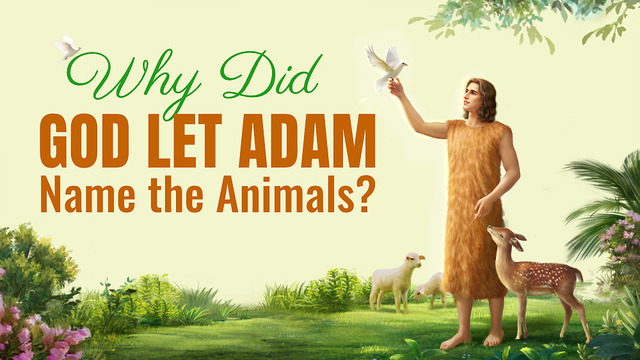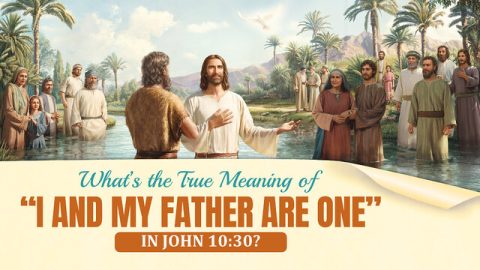By Lin Li
The Bible says: “And out of the ground Jehovah God formed every beast of the field, and every fowl of the air; and brought them to Adam to see what he would call them: and whatever Adam called every living creature, that was the name thereof. And Adam gave names to all cattle, and to the fowl of the air, and to every beast of the field” (Genesis 2:19–20). Whenever I read these verses, I always thought: Adam named all the livestock animals, all the birds and all the beasts of the field. He must have known all these living things; otherwise how would he have come up with so many names? Or else Jehovah must have told Adam all the animals’ names beforehand, and only then did he know by which name each should be called. I pondered this issue for a long time, but I still couldn’t figure it out.

Only when I read a passage of God’s words did I understand the will of God that was hidden behind His asking Adam to name all the animals. God’s words say, “This line tells mankind a fact: God gave man intelligence when He created him. That is to say, man’s intelligence came from God. This is a certainty. But why? After God created Adam, did Adam go to school? Did he know how to read? After God made various living creatures, did Adam recognize all of these creatures? Did God tell him what their names were? Of course, God also did not teach him how to come up with the names of these creatures. That is the truth! How, then, did Adam know how to give these living creatures their names and what kind of names to give them? This is related to the question of what God added to Adam when He created him. The facts prove that when God created man, He added His intelligence to him. … God created man, breathed life into him, and also gave him some of His intelligence, His abilities, and what He has and is. After God gave man all of these things, man was able to do some things independently and think on his own. If what man comes up with and does is good in the eyes of God, then God accepts it and does not interfere. If what man does is right, God will let it stand. So, what does the phrase ‘whatever Adam called every living creature, that was the name thereof’ indicate? It indicates that God did not see fit to alter any of the names given to the various living creatures. Whatever name Adam called a creature, God would say ‘So it is,’ affirming the creature’s name. Did God express any opinion on the matter? No, He certainly did not. So, what do you gather from this? God gave man intelligence and man used his God-given intelligence to do things. If what man does is positive in the eyes of God, then it is affirmed, acknowledged, and accepted by God without any judgment or criticism. This is something no person or evil spirit, or Satan, can do. Do you see a revelation of God’s disposition here? Would a human being, a corrupted person, or Satan permit anyone else to do something in their name, right under their nose? Of course not! Would they fight over this position with that other person or other force that is different from them? Of course they would! If it were a corrupted person or Satan who was with Adam at that time, they would have certainly repudiated what Adam was doing. To prove that they have the ability to think independently and have their own unique insights, they would have absolutely denied everything Adam did: ‘You want to call it this? Well, I’m not going to call it this, I’m going to call it that; you called it Tom but I’m going to call it Harry. I have to show how clever I am.’ What kind of nature is this? Is it not wildly arrogant? And what of God? Does He have such a disposition? Did God have any unusual objections to what Adam was doing? The answer is unequivocally no! Of the disposition God reveals, there is not the slightest hint of argumentativeness, arrogance, or self-righteousness. That much is clear here. This may appear to be a minor point, but if you do not understand God’s essence, if your heart does not try to figure out how God acts and what God’s attitude is, then you will not know God’s disposition or see the expression and revelation of God’s disposition. Is that not so? Do you agree with what I just explained to you? In response to Adam’s actions, God did not grandiosely proclaim, ‘You have done well, you have done right, and I concur!’ In His heart, however, God approved, appreciated, and applauded what Adam did. This was the first thing since creation that man had done for God at His instruction. It was something man did in God’s stead and on God’s behalf. In God’s eyes, this arose out of the intelligence He bestowed upon man. God saw it as a good thing, a positive thing. What Adam did at that time was the first manifestation of God’s intelligence in man. It was a fine manifestation from God’s point of view. What I want to tell you here is that God’s aim in imparting to man something of what He has and is and of His intelligence was so that mankind could be the living creature that manifests Him. For such a living creature to act on His behalf was precisely what God had been longing to see” (The Word, Vol. 2. On Knowing God. God’s Work, God’s Disposition, and God Himself I).
After reading these words of God, I suddenly saw the light. It turns out that Adam did not name all the animals because he had known them all right from the start, and it was not done by God telling Adam what they should all be called beforehand. Instead, God gave Adam intelligence when He created him, and it was by relying on this intelligence which God had endowed him with that Adam was able to give all the animals different and interesting names. From this we can see that, when God first created man, He not only gave him the breath of life, but He also imparted some of His own intelligence and what He has and is to man, thus enabling man to be able to think and act independently, and to be able to live normal lives. At the same time, we can see that God’s wisdom and deeds were manifested through man doing positive things. After Adam had named all the animals, God did not change any of them, but instead approved everything Adam did. This allows me to see God’s essence of goodness and that there is not one shred of arrogance or conceit within God’s disposition. As long as Adam obeyed God and did some positive deeds in accordance with the requirements of God, then God would approve them, and God did not interfere with, negate or pass judgment on anything Adam did.
God’s disposition and what He has and is are absolutely absent in us corrupt humankind. Take when we are discussing an issue with other people, for example. We are very prone to negating other people’s opinions in order to affirm that we ourselves have a unique insight, and it is for this reason that we show ourselves off as clever and affirm that we are superior to other people. Sometimes, we know perfectly well that the opinions and suggestions of others are appropriate, but in order to maintain our position and image in the hearts of others, we find all kinds of reasons to repudiate the views of others. We absolutely have to get other people to go along with our own ideas, and that is why we always show off our talents. These, and other behaviors like them, are all controlled by our inner satanic nature of arrogance and self-importance. After we were corrupted by Satan, the satanic logic and axiom of “I am my own lord throughout heaven and earth” became deeply rooted within our hearts, our arrogant and self-important corrupt disposition became our life and we fell under the control of this corrupt nature. In no situation are we willing to fall behind others, our hearts listen to no one, and we always want to be top dog, scheme against others and vie with others for fame and fortune. We are simply unable to get along peaceably with others and, when we work hard for a time and still don’t come out on top, we then live in a state of suffering that we cannot escape from. From this, we can see that, by living by our satanic dispositions, we human beings reveal only corruption and no normal humanity at all. God’s essence, on the other hand, is humble and hidden, beautiful and good, without a hint of the corrupt dispositions of arrogance, self-importance and self-righteousness that we corrupt human beings possess. God created all things, He administers all things and He is all-powerful, and yet He never shows off His power and authority. When Adam performed deeds using the intelligence God gave to him, God gave His approval, and we can see from God doing this that He is both humble and loveable.
Moreover, from God’s praise and acceptance of the deeds which Adam did in accordance with the intelligence God gave to him, I came to understand God’s will and His requirements for us. God gave us His intelligence and imparted some of what He has and is into us in the hope that we would heed His words, do His will, act according to His requirements and satisfy His will, and become manifestations of His glory. In this way, our actions become most meaningful and most worthy, and they are most deserving of God’s praise and blessing. This is because God’s will when He created us was that we become able to glorify Him and manifest Him in our lives and bear witness for Him—this is the only meaning to our being created.
In God’s words, I finally came to understand God’s will that was hidden behind His allowing Adam to name all the animals. Although on the outside, this may seem like a minor matter, God’s disposition and what He has and is are revealed therein, and it encapsulates God’s intentions and hopes for mankind. I give thanks to God’s guidance for allowing me to unravel this mystery in my heart.





